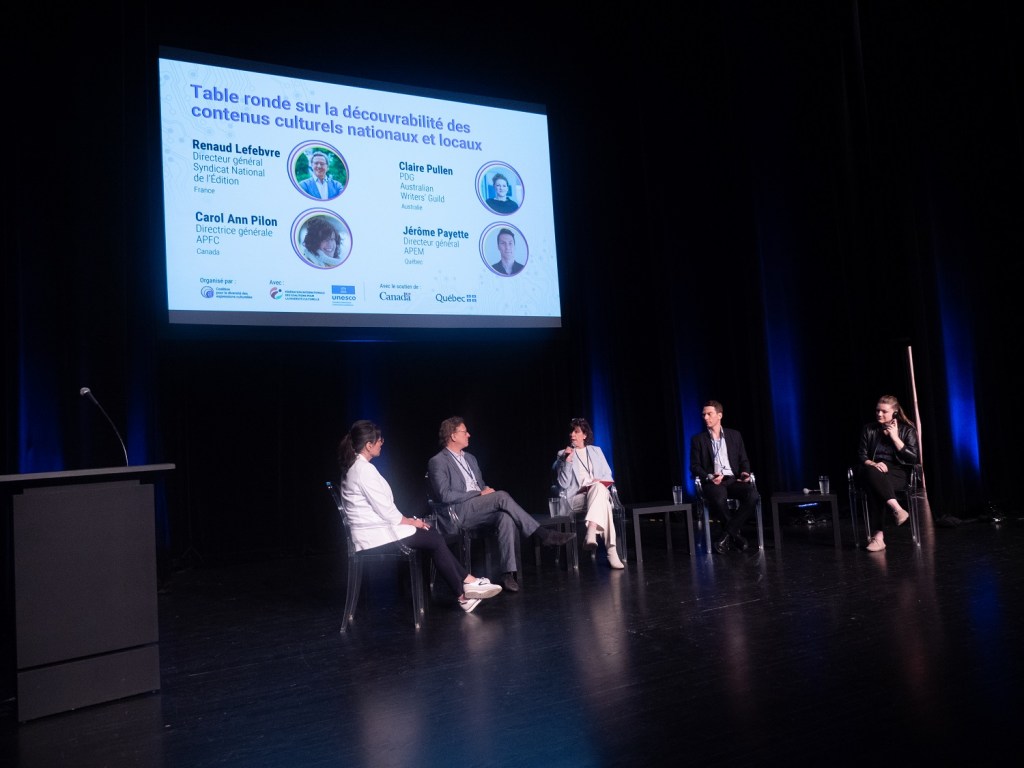The time has come for governments to differentiate between the creative industries and other sectors regarding the impact of AI, Australian Writers’ Guild (AWG) executive director Claire Pullen says.
Pullen joined international cultural leaders in Canada this week for Promoting Our Cultures in the Digital Age, a day-long conference held by the Coalition for the Diversity of Cultural Expressions that considers how digital technologies influence cultural expression.
Topics included the diversity and discoverability of local content, the transparency of digital platforms, and the impact of AI, which was the subject of the keynote address from Canadian intellectual property specialist and Cassels law firm partner Casey Chisick.
Pullen, who also serves as CEO for the Guild’s Authorship Collecting Society, said a particular line in Chisick’s address rang true globally.
“He said something along the lines of, ‘We have to manage how this impacts creators who are finding themselves ripped off when their work is being stolen by AI’,” she said.
“What that says to me is the government is now in a position to start grappling with the reality of what this looks like for creative people and starting to differentiate us from medicine, or epidemiology, or research and development – other types of industries where AI might provide a lot of good outcomes.”
It’s been more than six months since the AWG released a statement noting that if unregulated, the use of AI by corporate content producers represented “a clear and present danger to Australian writing, and consequently a significant dilution of the critical functions we perform”.
In March, the Australian Senate established a Select Committee on Adopting Artificial Intelligence (AI) to inquire into and report on the opportunities and impacts for Australia arising out of the uptake of AI technologies, for which there have been more than 200 submissions, including from the MEAA and Screen Producers Australia. The committee will report to Parliament in September.
A recent survey of MEAA members revealed that three-quarters were extremely concerned about theft of intellectual or creative work, with other key concerns included the potential spread of misinformation (with 74 per cent reporting extreme concern); proliferation of deliberately harmful content (70 per cent); potential loss of human-led creativity (66 per cent); and AI-related job losses (59 per cent).
It comes as Open AI was forced to suspend its voice-assisted tool after many noted a more than passing resemblance to the voice of Scarlett Johansson, who had declined an offer to become involved with the project.

Pullen said Johansson’s experience was similar to that of some AWG members over the past 12 months, including the authors found on a dataset of pirated ebooks, known as Books3, used to train generative AI.
“It’s great that everyone has a reason to bite down on the problem and look at how we are going to fix that,” she said.
“If we agree that it’s unacceptable for a really high-profile artist like her then it should follow that it’s unacceptable for any creative.
“We’re confident we can regulate AI without stifling innovation and there are ways to [utilise it] that don’t come at the cost of creative.”
As part of the conference, Pullen joined a multi-lingual panel with industry representatives from Canada and France that discussed the discoverability of national and local cultural content.
She agreed with her fellow speakers in the importance of shifting the conversation away from purely business decision-making and towards government support of rich and diverse local cultures.
“So many of the arguments around quotas, discoverability, and local content are framed as commercial questions, but it’s just as vital that governments consider the importance of diverse cultural expressions and the intersection of culture with social and democratic issues,” she said.
Pullen pointed to the decline of free-to-air kids’ content, and the dropping hours of Australian scripted drama as evidence of the urgent need for action.
“We’ve seen in recent days reports that streamers are cutting what little local Australian content they have from their libraries,” she said.
“In some cases, new Australian films are being removed within a year of release, and what does remain can be difficult to find when international blockbusters and US series are prioritised on the home page.
“The content we will get if we don’t advocate for diverse cultural expressions will be boring, it will be bland, it will be homogenous.”


